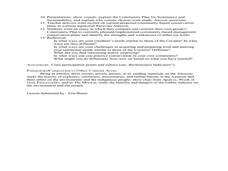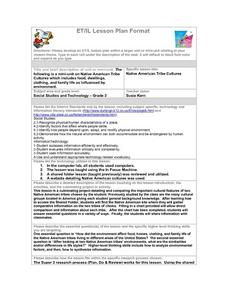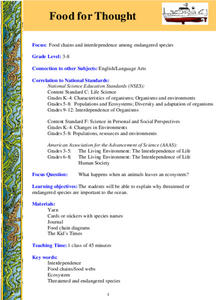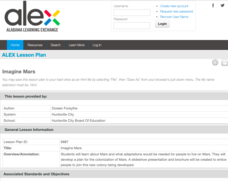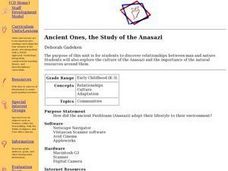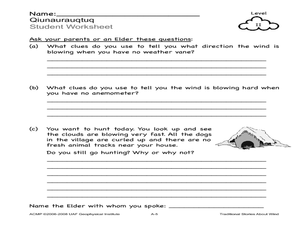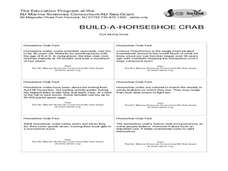Curated OER
Predator-Prey Relationships
Young scholars understand ecological systems. They provide experiences to assist citizens to increase their sensitivity and stewardship for the environment.
Curated OER
Predator-Prey Relationships
Learners explore the interrelatedness of predators and prey in four different activities. They simulate an aquatic insect, fish, and osprey food chain during a poker chip game, play an M&M game to simulate the relationship between...
Curated OER
Supermarkets, Sustenance and Sustainability
Students investigate jungles and the people who depend upon them. In this sustainability lesson, students research wild life conservation and discover the importance of a jungle to Amazonian people. Students create a group presentation...
Curated OER
Native Americans: Origins
In this Native Americans worksheet, students read about the origins of the Native Americans and the discovery of North America. Students also read about the arrival of the Europeans to the continent and the Plains Indians.
Curated OER
Native American Tribe Cultures
Third graders choose two Native American tribes to compare and contrast using an assigned website. They complete a chart that shows how the tribes are the same and different. Using information gathered on their charts, they answer...
Curated OER
Food for Thought
Students explore the food chains in a variety of ecosystems and its relationship to the survival of threatened or endangered marine animals or fish in the ocean. The interdependence of the species is investigated in this lesson.
Curated OER
Walking for Water Mini-Unit
Pupils participate in an activity that requires them to consider the availability of water. In this "walking for water" lesson, students read "Women Bear the Weight of Water," and respond to discuss questions regarding the article....
Curated OER
Caring for the Land
Students study soil management and issues relating to agriculture and the environment. In this agriculture and environment lesson plan, students define the terms farmer, environmentalist, and activist. Students use a Venn diagram to...
Curated OER
Food for Thought
Learners understand the importance of each member of a food chain through a game. In this food chains lesson, students receive background information and then play a game to simulate what happens in the food chain of an endangered...
Curated OER
Weather and Climate
Pupils identify the words plain and climate and discuss what would happen if it never rained. Students identify and interpret the weather in Poland and create a web illustrating various weather patterns. Pupils write a 4-line poem...
Alabama Learning Exchange (ALEX)
Imagine Mars
Middle schoolers research the planet of Mars using the Internet. They analyze the factors that would enable people to live on Mars and present a slideshow presentation and brochure about Mars.
Curated OER
Ancient Cultures
Students develop archeological skills in order to explain how scientists determine what ancient cultures were like. They develop an appreciation of the work that is involved in finding out about our past.
Curated OER
Ancient Ones, the Study of the Anasazi
Learners explore relationships between man and nature. They examine the culture of the Anasazi and the importance of the natural resources around them. Students examine reasons for Anasazi people to leave this area.
Curated OER
Eastern Woodland Indians
Fifth graders research the Eastern Woodland Indians in this lesson. They list the tribes and write a description of the physical environment. They list examples of the types of food, clothing, transportation, home/shelter,...
Curated OER
Making Your Local Ethical Shopping Guide
Learners write a research action plan on how to buy products that are environmentally friendly even in tough world conditions. In this ethical business lesson plan, students learn that the economy, food prices, natural disasters, and...
Curated OER
V-R-A-N-T-S-I-S and Me
Students discuss themes and issues of culture, identity and self-esteem. They construct responses to those themes. Students profile themselves and try to answer questions about themselves tied to the themes of this lesson.
Curated OER
D'Nile Is Where It's At!
Students travel down the Nile River to survey ancient Egypt in this unit of nine lessons. Data about pharaohs, hieroglyphics, growing crops, pyramids, the geography, and the sacred rituals are explored in this unit.
Curated OER
Reindeer Herders
Learners examine the life of of nomadic herders in Siberia. They read and discuss an article and maps from National Geographic, identify threats to this way of life, and write a letter to the Russian government identifying ways to...
Curated OER
Martha Who?
Students explore how the number and types of organisms an ecosystem can support depends on the resources available and on abiotic factors, such as quantities of light and water, a range of temperatures, soil composition. They are...
Curated OER
Worksheet 2. Vocabulary Practice
In this vocabulary worksheet, students choose the word or phrase that means the same as the word or phrase in bold in each sentence. There are 12 questions to answer.
Curated OER
Traditional Stories about Wind
Young scholars observe and talk about wind using no weather instruments. In this wind lesson plan, students use their senses to observe wind. They also interview an Elder about wind.
Curated OER
Lincoln Meets Gates
Students research historical figures and create presentations for their research using technology tools. For this historical figures lesson, students use the provided links to research historical figures in America. Students then use...
Curated OER
Looking and Learning in the Art Museum
Pupils analyze art in a museum and write an essay about the responsibilities of museum professionals. In this museum and art lesson, students identify the roles of an art museum. Pupils evaluate the ability of a museum to fulfill its own...
Curated OER
Build-A-Horseshoe Crab
Students discover many facts about horseshoe crabs. Students identify the main body parts of horseshoe crab. They explore the habits of the horseshoe crab and their importances to the ecosystem. Adaptations for younger students are...




